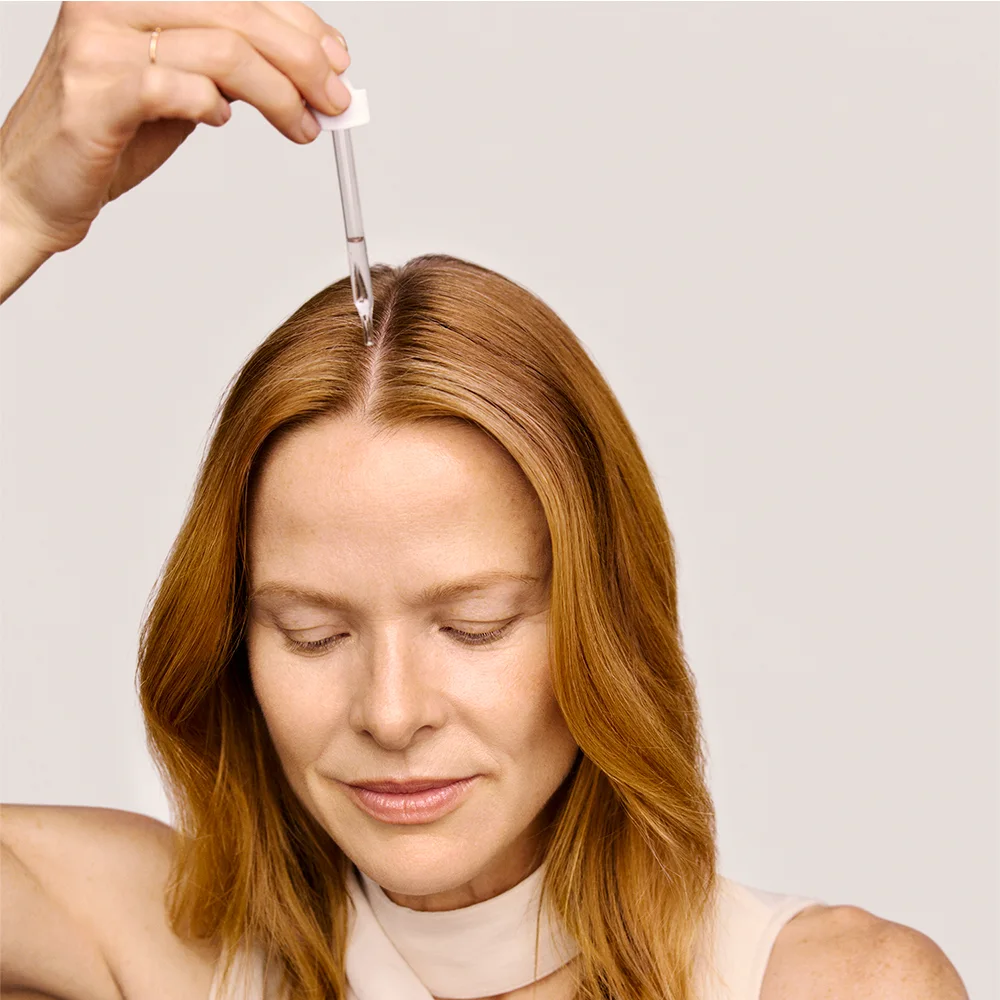Here's what we'll cover
Here's what we'll cover
There are many reasons women lose hair. Genetics, aging, hormonal fluctuations, and a variety of stressors can all take a toll on hair. Stressors can range from illnesses, vitamin deficiencies, and psychological stress, to another common culprit: medications.
Many medications list hair loss as a potential side effect. Still, with the exception of chemotherapy drugs, this side effect is not common. However, many women do notice hair shedding with certain drugs. It usually occurs within three months of taking a medication. The severity depends on the types of medications, the dosage, and if you are sensitive to its effects.
Drugs that cause hair loss in women
There are many drugs women commonly take that can trigger hair loss, also known as alopecia. Some medications can interfere with the way hair grows, increasing the risk of two types of hair loss: anagen effluvium and telogen effluvium.
Anagen effluvium occurs with treatments like chemotherapy when hairs in their growth (anagen) phase are damaged and break off. About 90% of hairs on the head are in the anagen phase at any given time (Saleh, 2022).
Telogen effluvium, usually caused by some type of stress to the body, triggers hairs in the resting (telogen) phase to fall out and can move anagen hairs into the resting phase. Most cases of drug-induced hair loss are due to telogen effluvium and do not lead to permanent baldness (Hughes, 2022;Rebora, 2019).
The following classes of medications are commonly used by women and have been linked to hair loss:
Female hormones
Both oral contraceptives and hormone replacement therapy can lead to hormonal changes that can trigger telogen effluvium and, in some cases, female pattern baldness. Both starting and stopping medications can result in thinning hair. Some studies show this may be linked to progesterone or the withdrawal of estrogen (Desai, 2021; Piraccini, 2006; Garg, 2014).
Thyroid medications
Women are more likely than men to have thyroid problems. The thyroid is a butterfly-shaped gland that helps regulate the body’s metabolism. Both an underactive (hypothyroidism) and overactive thyroid (hyperthyroidism) are linked to hair loss. The medications used to treat these conditions can also lead to thinning hair, especially at the start of treatment. Once thyroid levels are balanced, hair growth usually returns to normal (Phillips, 2017; MedlinePlus, 2019; MedlinePlus, 2017).
Immunosuppressants
Women are more likely to battle autoimmune diseases like rheumatoid arthritis and lupus than men. Various drugs treat these conditions by suppressing the immune system. Some of these disease-modifying antirheumatic drugs (DMARDs), such as methotrexate and leflunomide, may trigger hair loss (Benjamin, 2022).
Antidepressants and Mood stabilizers
Medications for depression, anxiety, and mood stabilization carry a risk of hair loss. Some of these drugs include (Etminan, 2018; Garg, 2014):
Paroxetine (Paxil)
Sertraline (Zoloft)
Fluoxetine (Prozac)
Bupropion (Wellbutrin)
Citalopram (Celexa)
Escitalopram (Lexapro)
Amitryptiline (Elavil)
Valproic acid (Depakote) (Druschky, 2018)
Oral retinoids (vitamin A)
Large doses of oral vitamin A can lead to telogen effluvium. The popular acne medication isotretinoin (Accutane) is derived from vitamin A. It can trigger hair loss, along with other serious potential side effects, and should not be taken during pregnancy (Lytvyn, 2022).
Over-the-counter dietary supplements can also affect hair. Taking too much vitamin A and selenium, commonly found in many hair supplement formulas, may have the opposite of the intended effect and lead to hair loss (Alomohanna, 2019).
Blood thinners
Anticoagulant medications can help prevent blood clots that can lead to heart attack or stroke. Some anti-clotting drugs, like heparin and warfarin, may result in hair loss, but more research is needed (Bonaldo, 2020).
Blood pressure medications
The medications that treat high blood pressure known as beta blockers and angio-converting enzyme (ACE) inhibitors can lead to some hair shedding. Beta blockers that may cause hair loss include metoprolol (Lopressor), propranolol (Inderal), and atenolol (Tenormin) (Garg, 2014). ACE inhibitors like lisinopril have also been linked to thinning hair (Kataria, 2017)
Other common drugs that may trigger hair loss include (Garg, 2014):
Cholesterol-lowering drugs
Nonsteroidal anti-inflammatory drugs (NSAIDs)
Antibiotics
Antifungals (Malani, 2014)
What to do if your medications cause hair loss
If you're taking a prescribed drug, don’t stop taking the medication or change the dosage without consulting your healthcare provider. Your provider may suggest an alternative treatment.
When you stop or switch medications, you may see evidence of new hair growth within 3–6 months, though it can take longer than that to regain the hair you had before. Sometimes, regrowth occurs after a transition period, even if you continue with the same medication. Fortunately, most cases of drug-induced hair loss are temporary (Hughes, 2022; Asghar, 2020).
Treatments for hair loss in women
If stopping or changing a medication doesn’t completely reverse hair loss, there are treatment options that can help promote hair growth. Topical minoxidil (Rogaine) may work in some cases by increasing blood flow and nutrients to hair follicles (Badri, 2021).
Telogen effluvium can occur simultaneously with female pattern hair loss. In that case, additional options such as the drug finasteride (Propecia) or oral minoxidil could be considered for some patients, prescribed off-label (Brough, 2017; Vastarella, 2020).
It’s best to work with your healthcare provider to sort out all possible causes of hair loss, including underlying illnesses or nutritional deficiencies. Achieving optimal hair growth starts with good overall health.
Finasteride Important Safety Information: Read more about serious warnings and safety info.
DISCLAIMER
If you have any medical questions or concerns, please talk to your healthcare provider. The articles on Health Guide are underpinned by peer-reviewed research and information drawn from medical societies and governmental agencies. However, they are not a substitute for professional medical advice, diagnosis, or treatment.
Almohanna, H. M., Ahmed, A. A., Tsatalis, J. P., & Tosti, A. (2019). The role of vitamins and minerals in hair loss: A Review. Dermatology and Therapy , 9 (1), 51–70. doi:10.1007/s13555-018-0278-6. Retrieved from https://www.ncbi.nlm.nih.gov/pmc/articles/PMC6380979/
Asghar, F., Shamim, N., Farooque, U., et al. (2020). Telogen effluvium: A review of the literature. Cureus, 12 (5), e8320. doi:10.7759/cureus.8320. Retrieved from https://www.ncbi.nlm.nih.gov/pmc/articles/PMC7320655/
Badri, T. (2021). Minoxidil. StatPearls . Retrieved on Jan. 12, 2023 from https://www.ncbi.nlm.nih.gov/books/NBK482378/
Benjamin, O., Goyal, A. & Lappin, S. (2022). Disease modifying anti-rheumatic drugs (DMARD). StatPearls . Retrieved on Jan. 12, 2023 from https://www.statpearls.com/articlelibrary/viewarticle/20574/
Bonaldo, G., Vaccheri, A., & Motola, D. (2020). Direct‐acting oral anticoagulants and alopecia: The valuable support of postmarketing data. British Journal of Clinical Pharmacology , 86 (8), 1654–1660. doi:10.1111/bcp.14221. Retrieved from https://www.ncbi.nlm.nih.gov/pmc/articles/PMC7373707/
Brough, K. R. & Torgerson, R. R. (2017). Hormonal therapy in female pattern hair loss. International Journal of Women's Dermatology , 3 (1), 53–57. doi:10.1016/j.ijwd.2017.01.001. Retrieved from https://www.ncbi.nlm.nih.gov/pmc/articles/PMC5419033/
Desai, K., Almeida, B., & Miteva, M. (2021). Understanding Hormonal Therapies: Overview for the Dermatologist Focused on Hair. Dermatology, 237, 786-791. https://doi.org/10.1159/000512888. Retrieved from https://www.karger.com/Article/FullText/512888
Druschky, K., Bleich, S., Grohmann, R., et al. (2018). Severe hair loss associated with psychotropic drugs in psychiatric inpatients—data from an observational pharmacovigilance program in German-speaking countries. European Psychiatry , 54 , 117–123. doi:10.1016/j.eurpsy.2018.08.003. Retrieved from https://pubmed.ncbi.nlm.nih.gov/30193142/
Etminan, M., Sodhi, M., Procyshyn, R. M., et al. (2018). Risk of hair loss with different antidepressants. International Clinical Psychopharmacology , 33 (1), 44–48. doi:10.1097/yic.0000000000000191. Retrieved from https://pubmed.ncbi.nlm.nih.gov/28763345/
Garg, T., Mendiratta, V., Yadav, P., & Agarwal, S. (2014). Drug-induced diffuse hair loss in females: An observational study. Astrocyte , 1 (2), 80. doi:10.4103/2349-0977.137849. Retrieved from http://www.astrocyte.in/article.asp?issn=2349-0977;year=2014;volume=1;issue=2;spage=80;epage=83;aulast=Garg#ref12
Hughes, E. & Saleh, D. (2022). Telogen effluvium . StatPearls. Retrieved on Jan. 12, 2023, from https://www.ncbi.nlm.nih.gov/books/NBK430848/
Kataria, V., Wang, H., Wald, J. W., & Phan, Y. L. (2017). Lisinopril-induced alopecia: A case report. Journal of Pharmacy Practice , 30 (5), 562–566. doi:10.1177/0897190016652554. Retrieved from https://pubmed.ncbi.nlm.nih.gov/27269276/
Lytvyn, Y., McDonald, K., Mufti, A., & Beecker, J. (2022). Comparing the frequency of isotretinoin-induced hair loss at <0.5-mg/kg/d versus ≥0.5-mg/kg/d dosing in acne patients: A systematic review. JAAD International , 6 , 125–142. doi:10.1016/j.jdin.2022.01.002. Retrieved from https://www.ncbi.nlm.nih.gov/pmc/articles/PMC8841364/
Malani, A. N., Kerr, L., Obear, J., et al. (2014). Alopecia and nail changes associated with voriconazole therapy. Clinical Infectious Diseases , 59 (3). doi:10.1093/cid/ciu275. Retrieved from https://pubmed.ncbi.nlm.nih.gov/24855150/
MedlinePlus. (2017). Methimazole. Medlineplus drug information . Retrieved on Jan. 12, 2023, from https://medlineplus.gov/druginfo/meds/a682464.html
MedlinePlus. (2019). Levothyroxine . Medlineplus drug information . Retrieved on Jan. 12, 2023, from https://medlineplus.gov/druginfo/meds/a682461.html
Piraccini, B., Iorizzo, M, Rech, G., et al. (2006). Drug-induced hair disorders. Current Drug Safety , 1 (3), 301–305. doi:10.2174/157488606777934477. Retrieved from https://pubmed.ncbi.nlm.nih.gov/18690941/
Phillips, T. G., Slomiany, W. P., & Allison, R. (2017). Hair loss: common causes and treatment. American Family Physician, 96 (6), 371-378. Retrieved from https://www.aafp.org/pubs/afp/issues/2017/0915/p371.html
Rebora, A. (2019). Telogen effluvium: A comprehensive review. Clinical, Cosmetic and Investigational Dermatology , 12 , 583–590. doi:10.2147/ccid.s200471. Retrieved from https://www.ncbi.nlm.nih.gov/pmc/articles/PMC6709511/
Saleh, D., Nassereddin, A. & Cook, C. (2022). Anagen effluvium. StatPearls . Retrieved on Jan. 12, 2023 from https://www.ncbi.nlm.nih.gov/books/NBK482293/
Vastarella, M., Cantelli, M., Patrì, A., et al. (2020). Efficacy and safety of oral minoxidil in female androgenetic alopecia. Dermatologic Therapy , 33 (6), e14234. doi:10.1111/dth.14234. Retrieved from https://pubmed.ncbi.nlm.nih.gov/32851744/










